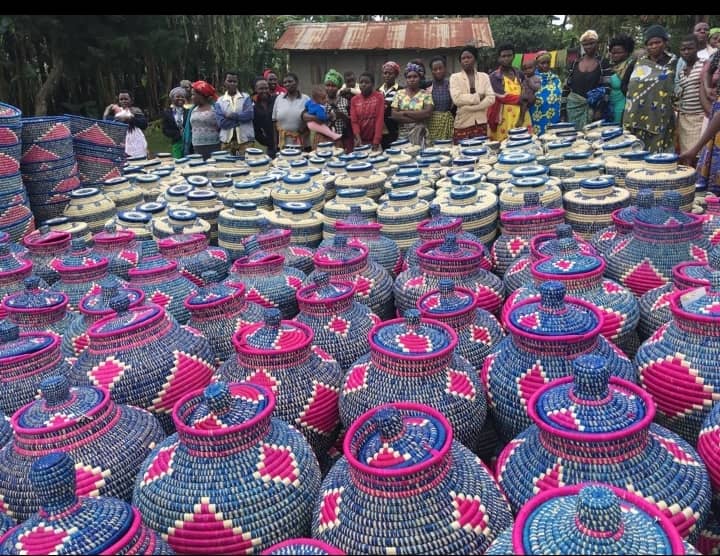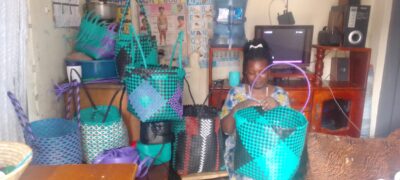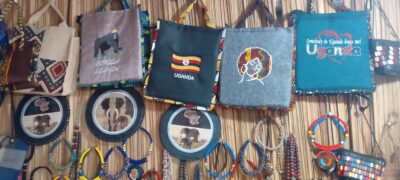
How women are crafting their way to financial independence
By Polite Musa
In Fort Portal City, women artisans are shaping their futures through the vibrant craft industry. Among them is Clair Mary Mbaine, a creative bag designer whose products, known locally as “Carrions,” are gaining popularity.
Living in Kabarole Hill, Central Division Fort Portal City, Mbaine is not alone in this journey Ms Gladys, a skilled basket maker from Bunyangabu district, also thrives in the industry.
Through their crafts, these women have become the primary earners for their families, transforming their skills into sustainable careers.

Clair and Her Carrions
From a young age, Mbaine’s dream fashion and design. After leaving school and marrying, she pursued her passion by designing unique bags called Carrions, crafted from durable, colorful materials.
“I didn’t have to invest much initially. I was already a housewife and wanted something to do after household work. With my husband’s support, I bought two rolls of material for Shs 150, 000,” Mbaine said.
She creates Carrions in various styles, colors, and sizes, catering to customer preferences for school bags, shopping totes, and large family bags.
Mbaine crafts from home and attracts many customers, impressed by the uniqueness of her designs.
“On a good day, I sell three to five Carrions, with prices ranging from Shs 15,000 to Shs 80,000, depending on the size. I don’t need to rely on my husband for petty expenses anymore, and I even contributed to buying land with him in our village,” she added.

Ms. Traxier Komuntare, chairperson of the Humura Rural Women’s Group, manages a craft shop along the Fort Portal-Kampala road, drawing customers with its vibrant displays. The shop, a haven for creativity, offers everything from yarn and beads to handcrafted baskets, jewelry, and clothing.
“People of all ages come to Artisan Alley, eager to learn and create,” Traxier said. She said that her shop’s prime location near tourist routes enhances its appeal around Fort Portal City.
Through Humura Rural Women’s Group, she has trained over 2,000 women across Fort Portal, Kabarole, and Bunyangabu, buying their crafts for resale in local markets and beyond.
Crafts as a Lifeline
For women like Birungi Yusinta, who joined Komuntare’s shop to sell her craft shoes and bags, the craft business has been life changing.
In Kabahango village, Buhesi sub-county, craft-making has enabled widows, single mothers, and unemployed youth to build homes, educate their children, and start small businesses.
“I left school in primary six, but with this work, I earn my own income,” Birungi said.
More Than Just Financial Gains
Komuntare believes that craft-making enhances financial independence, talent, and creativity while preserving cultural heritage.
“Here in Tooro, we traditionally use local papyrus baskets to store food. With today’s cultural shifts, these skills help maintain our heritage by using natural colors and materials,” she explained.
Gladys and the Art of Basketry
Ms Gladys Kahinju, a single mother of two from Buhesi sub-county, Bunyangabu district, is another success story. Known for her exquisite basket-making, Gladys earns between Shs 3 million and Shs 6 million each quarter by selling her baskets to exporters.
“I was originally a tailor, but I saw the potential in craft-making. I make about three baskets daily, averaging 70-90 baskets a month each priced between Shs 15,000 and Shs 30,000.
Gladys’s skill has also made her a mentor. She frequently trains other women’s groups, who pay to learn her weaving techniques. “Basket-making has allowed me to support myself and my family, and training others helps them achieve financial independence too.”
The cultural and economic impact of creativity
The work of Clair, Gladys, and Traxier said their power of creativity has transformed their lives. Their ventures have provided a sustainable income while inspiring other women to pursue similar paths.
“Craft-making has enhanced our financial security and also preserved our culture, our crafts blend natural colors and local materials, celebrating our culture in an age where it often feels eroded.”
Challenges faced by women in the craft industry
Despite their success, these women face significant obstacles. For Clair, the high cost of materials is a constant concern. “Materials come from far away, which impacts the final price of my bags,” she shares.
Additionally, unreliable customers occasionally order Carrions but cancel after production, leaving her with inventory costs. “Some even take items on credit and don’t pay,” she said.
Traxier said for her the decrease in tourist numbers, partly due to COVID-19 and regional instability in DR Congo, has affected the craft market.
“We used to see about 150 tourists a month, but now it’s around 80. The nearby conflict in DR Congo has also impacted the number of travelers who might pass through Fort Portal,” she said.
She said the lack of designated craft zones in Fort Portal City adds to the struggle because in other places like Masaka City, they have specific areas reserved for craft shops which makes it easy for rural artisans to bring their products to a centralized location.


